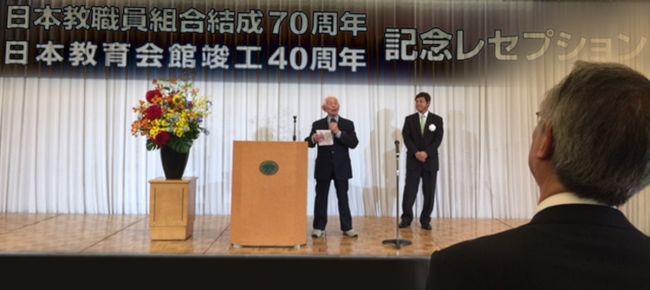Japón: su sindicato celebra siete décadas de compromiso
En una recepción muy concurrida en Tokio, el Presidente de JTU, Yuichiro Izumi, recordó los logros del sindicato en el ámbito de la defensa de los derechos de los/las docentes y en la promoción de una educación pública de calidad. Recordó también los cuatro principios que han guiado al sindicato de la educación desde su creación en 1947: total pacificación, adhesión a una política de neutralidad, oposición a la provisión de bases militares y resistencia a todo rearme. De hecho, el sindicato opone actualmente resistencia a los esfuerzos del Gobierno japonés por modificar la constitución del país, lo que le permitiría la creación de fuerzas armadas.
Rikio Kozu, Presidente de la confederación sindical RENGO, reafirmó el apoyo de su organización a los esfuerzos de JTU para mejorar la situación de los/las docentes en Japón. Los responsables del sindicato señalan que los principales desafíos a los que se enfrenta la profesión son la carga de trabajo de los docentes, sus largos horarios de trabajo, el mayor número de contratos temporales y la proliferación de las pruebas estandarizadas. Varios partidos políticos expresaron sus mejores deseos a JTU y se comprometieron a prestarle su ayuda para dar respuesta a algunos de estos desafíos.
IE: el legado de JTU
El Secretario General de la Internacional de la Educación (IE), Fred van Leeuwen, que también dirigió unas palabras a los asistentes a la recepción, señaló que el sistema educativo japonés ha demostrado ser el catalizador de la gran innovación tecnológica y los logros artísticos del país. “Gran parte del mundo en que vivimos actualmente ha salido de sus aulas, gracias esencialmente a su sindicato y a sus docentes, y todos hemos salido beneficiados”, comentó Fren van Leeuwen. Asimismo, entregó al sindicato el “Certificado de Mención de Honor” de la IE.
El 9 de junio, el Secretario General de la IE se reunió con varios miembros de la Dieta del Partido Demócrata, entre ellos el ex Ministro de Educación, Sr. Hirano.

[Fri, 09 Jun 2017 15:36:00 +0000] | DIGG THIS
